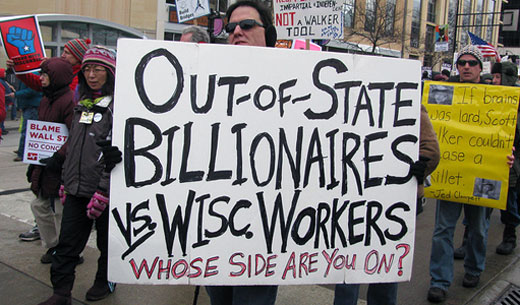
Dear Speaker Boehner,
When you were asked about President Obama’s plan to reduce the national debt by over three trillion dollars in the next ten years with half of that money to come from higher taxes on the very rich, you said “I don’t think I would describe class warfare as leadership.” In addition, you added “I don’t believe it makes any sense to tax the very people that we expect to invest in our economy, help grow our economy, and to create jobs in America.” You sound perfectly content with the fact that Warren Buffett pays less in federal taxes than does his secretary.
I find your argument twists and distorts reality. You raise the question of “class warfare” to divert attention from the serious problems our country faces, while your comment hides the fact that the Republican Party has been carrying on “class warfare” against the working class for a very long time. Let me explain, but first some background information.
Under our Constitutional system, a political party is supposed to represent the interests of the people. There are, however, some observers who raise the legitimate concern about those classes that the Republican Party actually represents. Let me give you an example. If one looks into the contributors to your 2010 re-election campaign, one finds that your major donors consisted of financial services, insurance, energy, and investment corporations. Hardly small business or worker-oriented interests by anyone’s measurement.
Along the same lines, those who contributed to the campaign of your second-in-command, Eric Cantor-the House Majority Leader-were remarkably similar. They included tobacco corporations, financial institutions, and investment services businesses. Again, no sign of any significant contributions from groups representing the working class.
Indeed, when one adds up all of the contributions from large corporations to all your Republican colleagues in Congress the total runs into the millions of dollars. One has to ask, “who do you represent-your constituents or the large corporations?”
You could respond by saying that corporations have rights. As you may know, one of your party’s presidential contenders, Mitt Romney even says that they are “people.” You would probably say that you also listen to your constituents, the “little guy.” That might sound plausible until you take into account your party’s tax and health care policies.
If one were to look at the tax rate on the wealthiest Americans in 1940, one would see that they paid at a rate of 68% on the part of their income over $250,000. That figure rose to 89% in the early 1960s. In the years since 1980, however, a time period of thirty-one years (of which your party has held the presidency for twenty of those years), the rate has dropped from 70% to 33%. If that is not a tax policy that favors the rich, then I do not know what is.
At the same time one must also look at the Republican Party’s opposition to a federal health care system for all. According to Pat Wechsler of bloomberg.com:
” Unemployment and rising expenses caused 9 million Americans to lose health insurance during the past two years, according to researchers backed by a group advocating access to health care.
Losses of coverage helped swell the ranks of uninsured adults in the U.S. to 52 million in 2010, according to a study released . . . by the Commonwealth Fund, a New York-based foundation that says it backs research aimed at expanding and improving care. An additional 73 million adults had difficulties paying for health care and 75 million deferred treatment because they couldn’t afford it, researchers said.”
If you add up the total number of people who either lost insurance, had difficulty paying for their care, or who deferred health care, we are talking about nearly half of the population of the United States. In light of these numbers, I ask, “Where is the Republican Party?” If you represent the people, then I would assume that you would never tolerate the situation outlined above. Yet, not a peep. To me, this inaction is class warfare on the poor and working people.
These are but two examples of Republican double-speak (or in some cases not speaking at all). There is much more that I could outline, but it would take much more than a letter to do it. Among the other areas that need to be addressed are: extension of unemployment benefits to those whose payments have run out; the right of workers to organize into unions; an increase in the minimum wage; and strengthening of social security, Medicare, and Medicaid. You get the idea.
In the future, if you want to discuss those issues that affect the working and poor people of the United States, stick to the issues and do not raise irrelevant issues and use scare tactics. Our country needs serious discussion on how to solve its major problems.
Sincerely yours,
David Cavendish
Photo: John Bachtell/PW

MOST POPULAR TODAY

Zionist organizations leading campaign to stop ceasefire resolutions in D.C. area


High Court essentially bans demonstrations, freedom of assembly in Deep South

Afghanistan’s socialist years: The promising future killed off by U.S. imperialism

Communist Karol Cariola elected president of Chile’s legislature






Comments